What’s the one game keeping you a dual booter? Maybe it’s PUBG, or Rainbow Six: Siege? Maybe it used to be Overwatch? For me, that game was Elite Dangerous, and one year on from Proton’s release, I have a story to tell.
There’s a certain “je ne sais quoi” about Elite Dangerous that I’ve never been able to put my finger on. It’s a game set in a scientifically modelled, full-scale replica of the whole Milky Way galaxy, and as with that setting, the game is truly vast, remarkably cold, and frequently incomprehensible. Yet, when playing Elite, I get the same feeling as when looking up at the stars on a dark and moonless night — my hungry soul is fed. Or it could just be space madness. Regardless, it’s a feeling that I like to dip into every once in a while, immerse myself in, and try not to drown.
Back in February of 2018 I signed up for Distant Worlds 2, an expedition to cross the whole of our galaxy and meet up with thousands of others on the other side, at a star system known colloquially as Beagle Point. The system is named as a memorial to the late dog of the first commander to reach it, but is also a location that holds a special place in many other Elite Dangerous players hearts, partially because it’s very much no mean feat to reach it, but also because in one direction it offers a jaw dropping view of our galaxy, and in the other, the sheer black and empty abyss of what lies beyond. In a game so frequently set to a backdrop similar to a mottled night sky, those views, and the immense pilgrimage taken to get there, act as an unparalleled reminder of the scale of the universe and our place in it. It’s the kind of experience that stands proud as the best of what video-games have to offer. I’d never been out that far before, and it would take months to get there, but I just couldn’t pass up that kind of opportunity.
There was one problem though. Elite Dangerous doesn’t have a Linux version, and still had significant issues with Wine. I’ve never been a “No Tux No Bux” kind of person, so I’d been playing the game on Xbox One first, and then on my Windows install, but this was slowly becoming the last game I needed that partition for. Even as a “dirty dual booter” I cringed at the thought of effectively changing my daily driver for a few months, but the expedition was also setting off in 2019, so I’d have to keep my gaming Windows setup alive and well at the very least for another year and a half. I wasn’t too happy with that prospect, but it was the hand I had chosen to reluctantly deal myself.
In summer, while preparing my ship for the trials ahead, Proton was launched and a ray of hope was lit. By winter, Elite was playable, but with lingering issues, and it still required a custom build with various patches and hacks. In testing, it still crashed or disconnected frequently for me, and had painful performance dips when on planets. It wasn’t enough, and I accepted my fate.
On January 13th we set off. I flew on Windows. The game servers crashed from the sheer thousands of spaceships all hyperspace jumping synchronously into the black. At least those crashed servers were probably on Linux.
I arrived at Beagle Point late after almost 5 months out there, on the 8th of May, and it was everything I’d hoped — a humbling journey and a pensive rest at the edge of our galaxy. I met with some folks on the surface of a world as far from home as we could imagine, and recounted tales of near deaths, earth-like worlds and black hole sunsets. Meanwhile, on the way, something amazing happened. Those custom patches had made their way into mainline Proton, DXVK had improved, and suddenly, with one small tweak (installing dotnet40, needed for the launcher), I could fly my ship on Linux.
Not only that, but the issues I’d always had with the drivers for my HOTAS, a Saitek x52 Pro, were all gone, including installers that aren’t even fully compatible with Windows 10, default clutch modes that just don’t go away, and weird bugs picking up some buttons as a 2nd mouse. On Linux, a perfectly usable driver for the joystick and throttle is right there in the kernel! The game fully picked up my Ultra-Wide monitor, when on Windows the OS would fight and move my other windows around failing to compensate. “ED Market Connector”, an external app I use for journey tracking, trade data sharing, and more, has a fully working Linux version. Lastly, and this blows my mind, it all works in VR — Sheer magic.
I made my way back to Sol on Linux, faster this time, enjoying every minute of an experience I’d wanted for years. I docked my limping but mostly intact Beluga cruise liner at a starport in the tiny human occupied bubble of space two months later on the 29th of July. I felt like I’d achieved something, and most importantly I’d been able to finally do it on home turf. I set off on Windows, but I came back changed, and these days, my Windows install is kept around almost entirely for work.
I wouldn’t claim that it’s a game for everyone, but there are a huge number of us who enjoy it’s take on the space genre. The fantastic blend of difficulty, control, subtlety, agency, scale, individuality and community all make Elite Dangerous a powerful experience. Those factors all make Linux great too, it’s impossible not to see the clear parallels. They’re both difficult at first, but a joy once you get going, full of wonderful nerds with their own stories and reasons to be, sharing their customisations, doing the hard stuff for its own sake, and creating something much greater than the sum of its parts. A year after Proton released, it’s a match made in the stars.
If you do see me out there in the black, don’t be afraid to say hi and share your stories too. Maybe we can start a squadron of penguin commanders.
You can pick up Elite Dangerous on Steam.
Quoting: PatolaOf course it is, Ubuntu is just a fork of Debian :pQuoting: slaapliedjeIt's packaged in Ubuntu too and I had a lot of fun with x52output changing the display, but have you guys ever played a game which supported the display, like, sending messages to it or changing the leds?Quoting: Marc Di LuzioIt's also already packaged in Debian.Quoting: slaapliedjeNeeds moar buttons!! If you can afford it, go for the Logitech (or Saitek, but avoid Mad Catz brand) x52 (or thr Pro version). It is the model for the controller in game. The thrust portion for some reason looks like the Thrustmaster, but the flight stick is almost exactly like the x52. Plus Linux has tools for it if you feel like messing with the MFD. But it otherwise works out of the box.
https://github.com/nirenjan/x52pro-linux for the x52 Pro MFD user space driver!
apt search x52
Sorting... Done
Full Text Search... Done
libx52pro-dev/stable,unstable 0.1.1-2.3+b1 amd64
MFD and LED library for Saitek X52pro joysticks - dev files
libx52pro0/stable,unstable 0.1.1-2.3+b1 amd64
MFD and LED library for Saitek x52pro joysticks
I haven't seen any actual games support the x52output program for updating the display. There isn't anything in the repositories that suggests/depends on the package as far as I can see.
About flight sticks, I use a "Saitek Cyborg 3d gold" (a bit of a relic) with X-Plane 11, and it works beautifully. In ED it was detected no problem, and I could assign all buttons and axes no problem, but the calibration was wrong and kept pulling to one side. In Linux the calibration is fine, but there are no calibration options in ED, or in wine/proton that I can find. Works fine with XBOX 360 controller though.
Last edited by FredO on 26 August 2019 at 8:34 am UTC
I think I said it before, but I'll summarize it.
If you're planning on getting an x52;
Saitek: Good
Mad Catz: Crap
Logitech: Good.
Apparently the original Saitek was bought by Mad Catz and they're quality control sucked, so that brand of them tend to break easier. Logitech then bought Mad Catz and are using closer to the original plans that Saitek used. I actually have a Saitek branded one because I bought my controller years ago. The only thing wrong with mine is that a few of the buttons have the ink rubbed off on them. Otherwise it's tip-top. And I've put in a lot of hours of Elite: Dangerous. 200+
Edit: someone (some of you probably?) was writing about a Linux squadron on forums – if anyone makes one, I'm all for joining it!
Last edited by Faalagorn on 1 September 2019 at 7:03 pm UTC
Quoting: FaalagornLike I said, I've came back to the game with my wife too, both bought Horizon DLC – .NET was a little pain to set up initially, but the game runs fine afterwards! o7 - CMDR FaalagornWe should work something out so we can get a fleet carrier! I need to get it working reliably in the Index.
Edit: someone (some of you probably?) was writing about a Linux squadron on forums – if anyone makes one, I'm all for joining it!
Quoting: slaapliedjeQuoting: FaalagornEdit: someone (some of you probably?) was writing about a Linux squadron on forums – if anyone makes one, I'm all for joining it!We should work something out so we can get a fleet carrier! I need to get it working reliably in the Index.
I'll be setting up a squadron, just looking for a name! And assuming a carrier is somewhere in the 500m to 1b range I'll be able to buy one as soon as they're out and we can dock!
I'm pretty new in Elite though, so I'm having trouble figuring out what information to actually display and what might be useful.
If anyone wants to discuss this, let me know :)
Quoting: CybolicI've started working on a companion program for the X52 MFD since the only one I've found so far is Windows-only.Awesome! So there is one thing you have to do in Windows for the X52, enable the clutch button. That way you can use it for thruster boost.
I'm pretty new in Elite though, so I'm having trouble figuring out what information to actually display and what might be useful.
If anyone wants to discuss this, let me know :)
But I'm not sure about the MFD. Would be interesting if you could integrate it into having a clock for mission time or something. I play in VR though so actually looking at the MFD is kind of hard for me.
Edit: the packaged libx52 does have a mfd tool, I was playing with it at one point in time, but it's not a graphical one by any means.
Last edited by slaapliedje on 6 September 2019 at 9:14 pm UTC
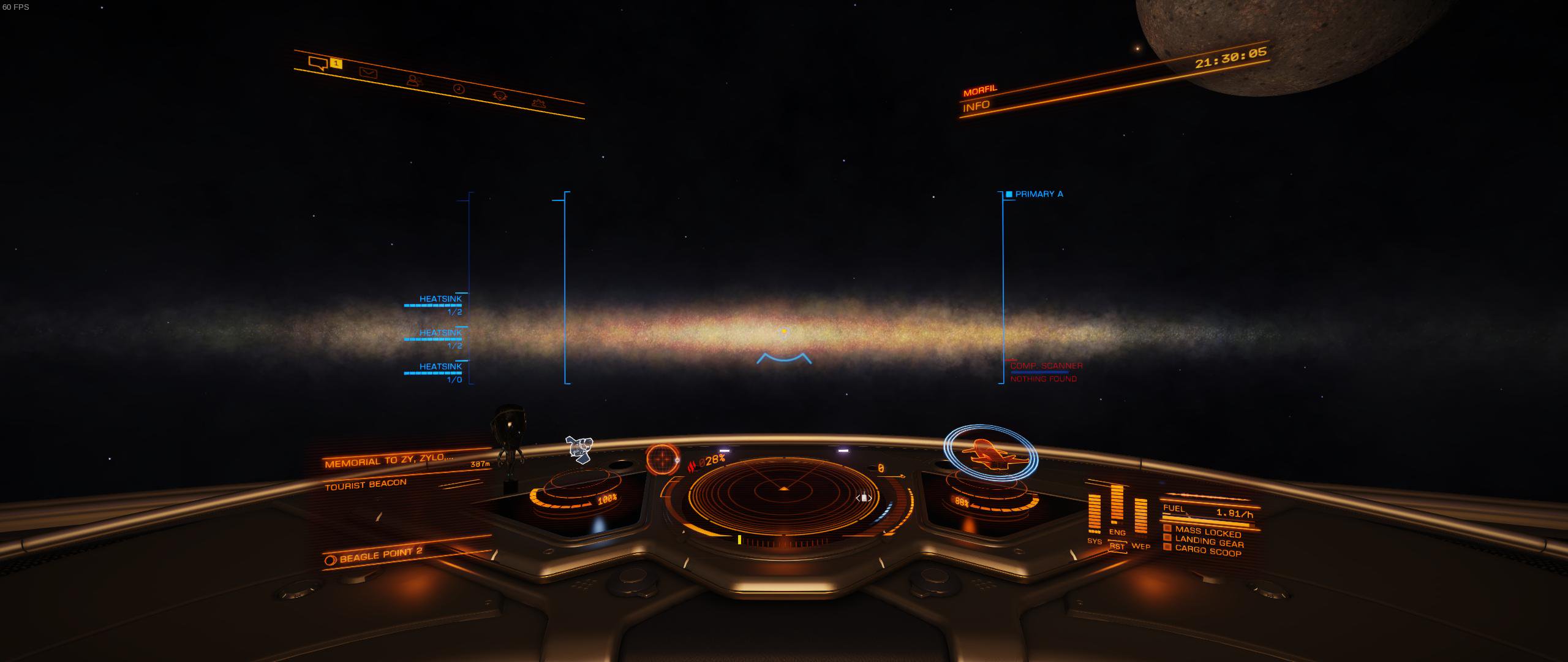
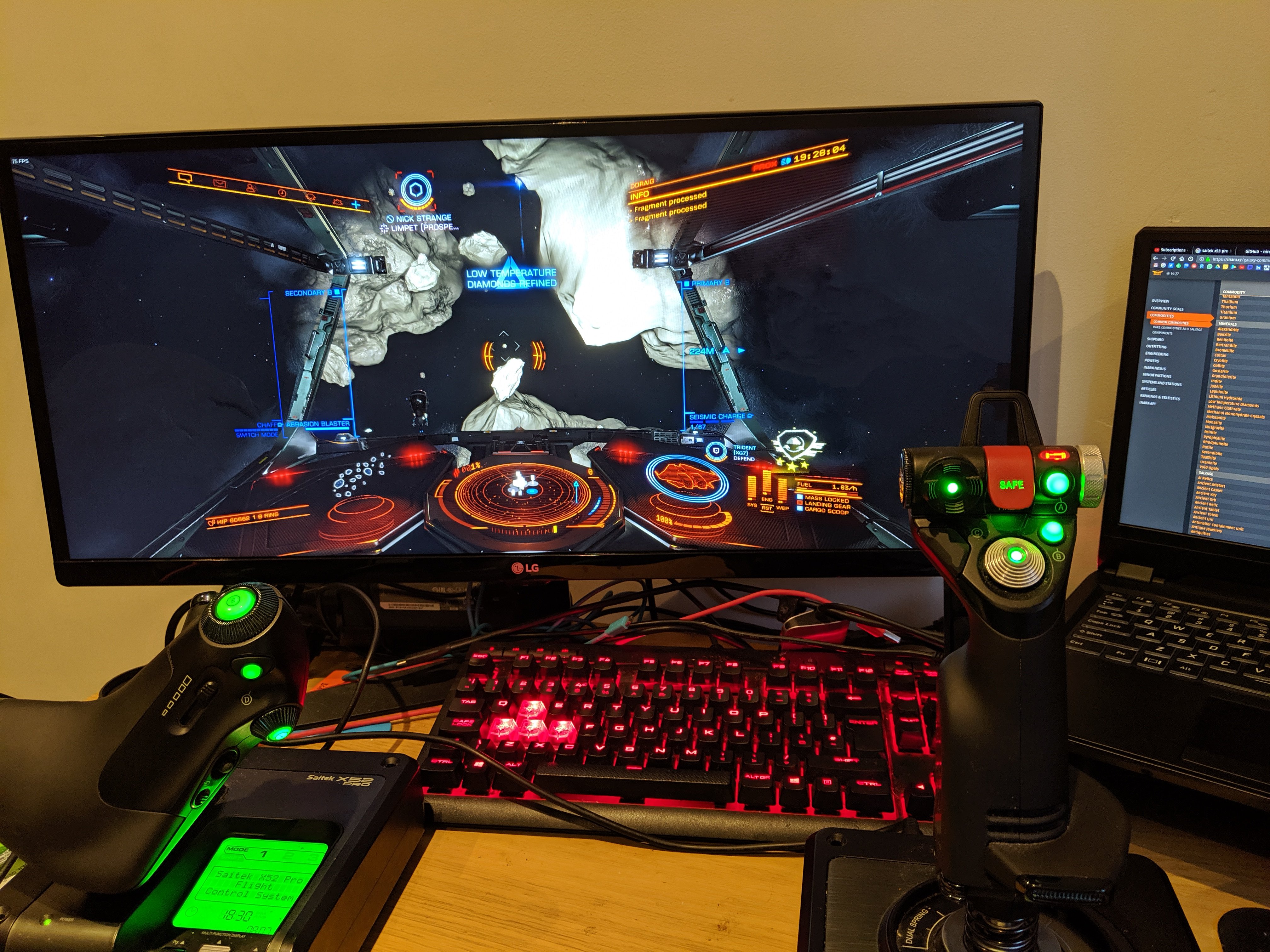
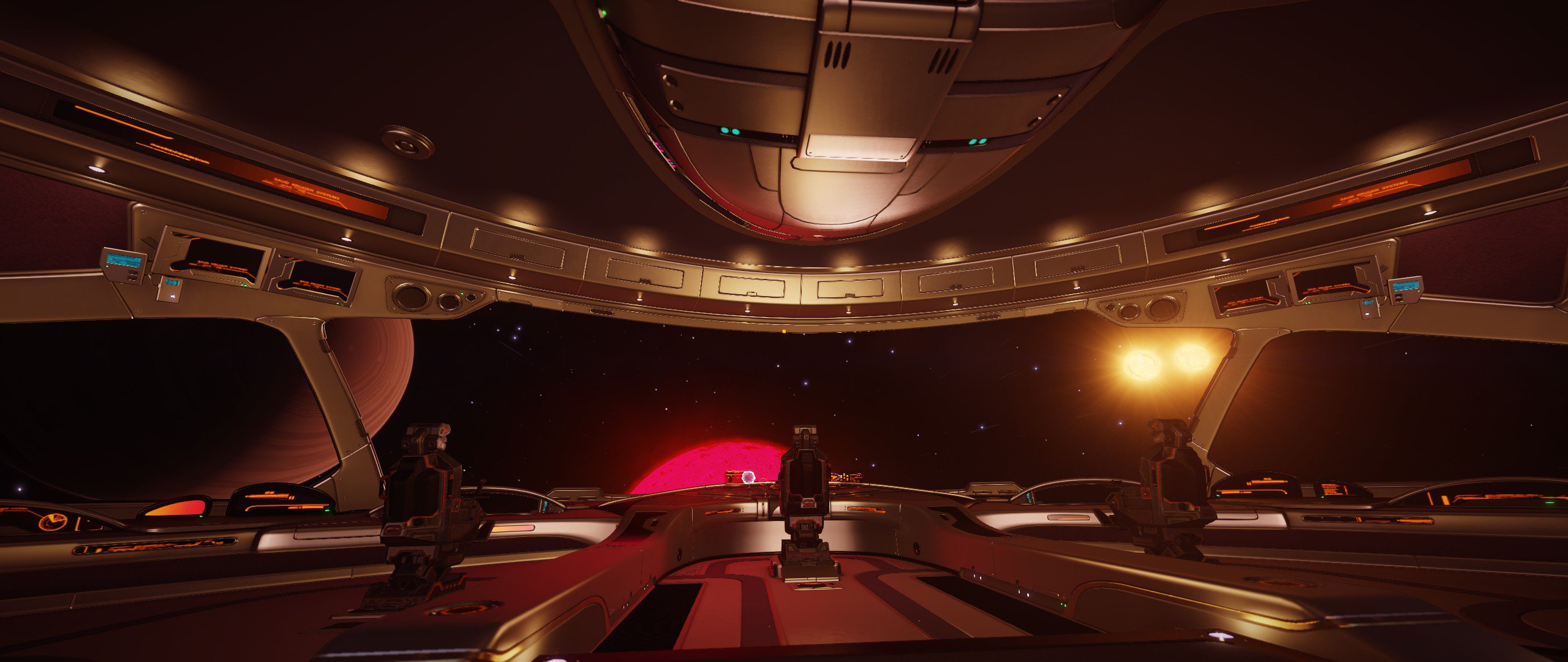
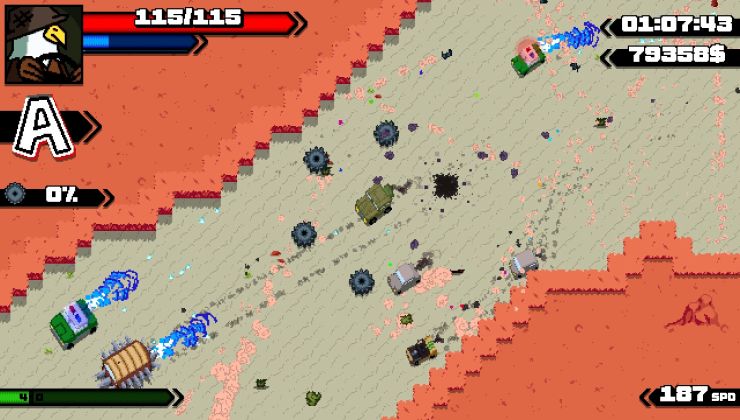


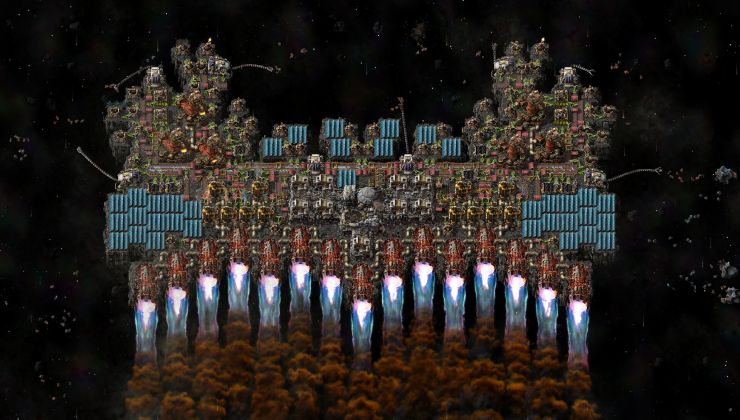





See more from me